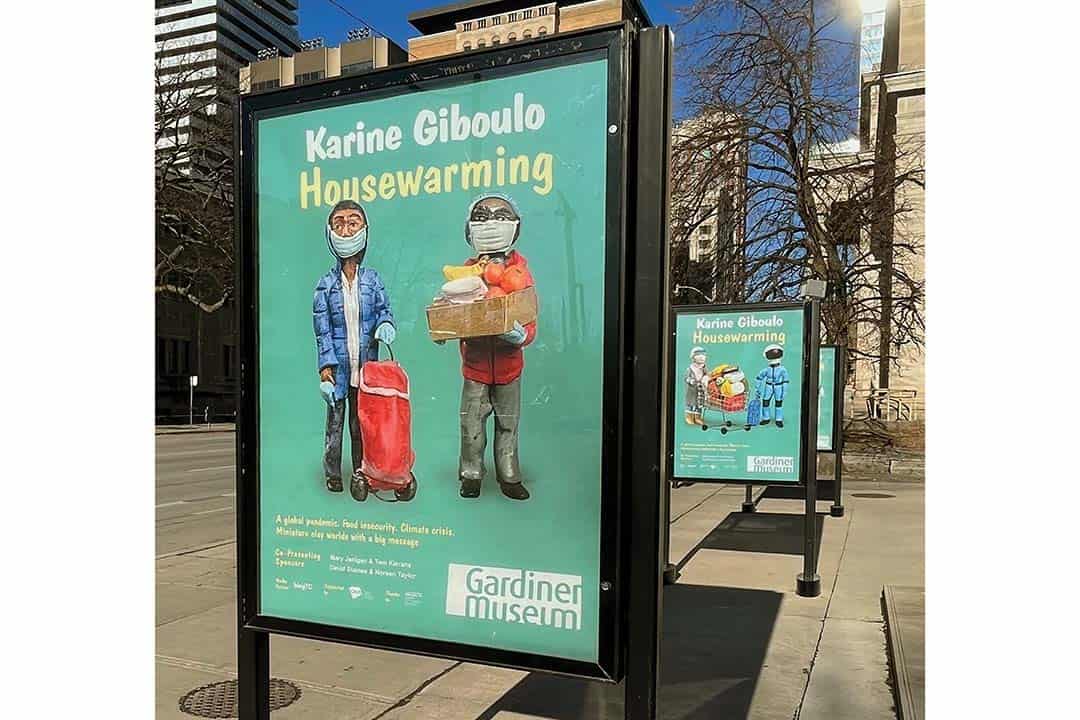Hidden in your new Amazon package is the hard work of the factory workers who shipped it. Tucked away in your closet are the toilings of a little old woman who loves to knit, and concealed inside your delicious cabbage is the skill of many farmers.
Karine Gibulo’s newest art exhibition at the Gardiner museum shows us the stories behind the objects in our house, in all their charm and existential dread. The exhibition — which opened on October 20 and will be at the Gardiner museum until May 7, 2023 — uses 500 miniature figures strategically placed throughout a model home to show the way that global issues surrounding the pandemic, climate change, and factory labour affect each of us personally.
Clean your room!
The exhibition is structured as a house eerily reminiscent of my own home. You enter through the front porch with an Amazon package patiently waiting to be opened. You snake through the kitchen, with its oversized fridge, and see a study filled with curiosities. It’s simply a regular house — yet, unlike in my house, whimsical little people are posed throughout it, contending with the harsh realities of our world.
Each miniature tableau, whether in a box or a bathtub, contains a multitude of social messages. Gibulo tackles climate change with polar bears hiding in the melting ice of the fridge. In the living room, a forest fire — started by the same type of iron that my mother owns — threatens animals’ lives. In the study, the curiosities on display are not just curiosities, but in fact, old people who have shrunk so much they’re kept in jars. The scene makes me think of all the seniors who have been isolated in nursing homes during the pandemic.
At times, Gibulo’s house feels overwhelming. In every room, there seems to be the lurking possibility of danger if there is no danger already in progress. When I have imagined tiny people making a world in my house, I have always thought of them as chipper explorers — yet Gibulo’s figurines all have the big sad eyes of the regular-sized people I already know. The minuscule young woman swimming in the bathroom sink seems just as full of dread as me.
Mom, I want to go home
These big sad eyes make the social issues Gibulo explores feel personal. It’s so easy to constantly see scenes of destruction and feel only apathy, but Gibulo is showing us these terrifying realities through new eyes — the 1,000 eyes of her miniature figurines, to be exact.
We hear so often about the pain in our world — the terror of Amazon factories, nursing homes, and forest fires — yet it feels so far off. We are safe from these nightmares in our own homes, or so we think!
Gibulo shows us that we are not. The problems of our world exist within all our lives, even if we want to ignore them.
The intimacy of Gibulo’s house makes these social issues feel even closer. When I looked at the pink flowers on the bedspread Gibulo had lovingly laid out, I felt like I was an intruder. The pains of our Earth are in our most intimate spaces; they even exist within the comfort of our beds.
Get out of my house
My house — and yours — is like Gibulo’s. Within the Amazon package on my front porch is the work of many tireless, underpaid workers. Maybe there’s even a story of climate change in the making of your iron.
I don’t want that anywhere near my home. I want my home to be mine, free from the problems of our world. Housewarming showed me that it’s not and that we cannot ignore the world. Social issues affect us all, whether we want to hide from them or not.
I wish that I could see the miniature people within my home — and I hope that one day, as our world improves, these labourers will consistently receive the respect they deserve.


